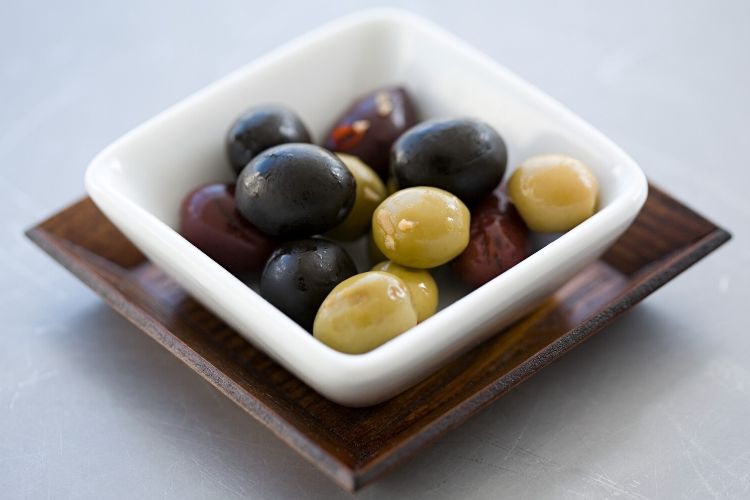
Olives are a savory snack that can be enjoyed on their own or as a tasty addition to meals. They’re also used to garnish drinks, like the ever-popular martini. They make a perfect topping for pizza, appetizers and salads.
In fact, fresh Kalamata olives and homemade olive oil dressing is a great way to bring your salad up a notch. Keep reading for a great Keto Greek Salad recipe which you’ll find later in this article.
Did you know that the olive is actually a stone fruit related to the peach? Olives can be purchased whole, pitted, or sliced. They may be green, purple or black in color.
Olive oil is a popular fat source that is derived from the olive. In fact, it’s one of the healthiest oils on the planet!
Not only are olives low in carbs, but they’re also high in healthy fats that support heart health. Additionally, they’re an excellent source of Vitamin E and contain powerful antioxidants that can help prevent cancer.
You may also be interested to discover that the oleic acid naturally occurring in olives has the power to keep blood sugar levels stable, which assists weight loss.
What’s more, this special fatty acid is also great for the health of your skin and hair. Later in this article, you’ll find DIY instructions on how to make your own all-natural moisturizing facial cleanser using olive oil.
Are Olives Keto Friendly?
Olives offer a good supply of heart-healthy fats which is the main reason why they make a perfect snack for those following Keto.
With a keto diet, it is recommended that 75% of your calories come from healthy fat, 20% from protein and only 5% carbohydrates. Olives are one of the best plant-based sources of fat out there, making them a perfect Keto snack to take with you to work or the gym.
The sodium content in olives may also prevent the dehydrating effects of the Keto flu by helping your body restore water balance.
How Many Carbs are in Olives?
A 100 gram serving of olives contains 3.1 grams of net carbs. There is only 1 gram of carbs in 6 pitted Kalamata olives. If you’re following a strict low carb diet, you can stretch this amount further by slicing the olives before adding them to your dishes. You’ll still get that great olive flavor, but you’ll consume fewer carbs.
How Many Calories are in Olives?
A 100 gram serving of olives contains 115 calories. There are only 35 calories in 6 pitted Kalamata olives. Most of the calories in olives come from the healthy fats they contain. If you’re following a calorie-reduction plan, adding sliced olives rather than whole ones to your dishes will allow you to get away with using less of them, which will help you to consume fewer calories.

Nutrition Facts
| Serving size: 3.5 ounces (100 grams) of ripe, canned olives |
| Calories 115 |
| Total Fat 10.7 grams |
| Saturated fat 1.42 grams |
| Polyunsaturated fat 0.91 grams |
| Monounsaturated fat 7.89 grams |
| Sodium 735 milligrams |
| Total Carbohydrate 6.3 grams |
| Dietary fiber 3.2 grams |
| Sugar 0 grams |
| Protein 0.8 grams |
Health Benefits
Vital Nutrients
Olives are a good source of the following vitamins and minerals:
- Vitamin E – Prevents heart disease, supports immune function, prevents inflammation, promotes eye health, and lowers cancer risk factors.
- Iron – Supports gastrointestinal processes and the immune system.
- Copper – An essential mineral often lacking in the Western diet that is associated with a lower risk of heart disease.
- Calcium – Assists bone, muscle, and nerve function.
Antioxidant-Rich
Olives are high in antioxidants, such as oleuropein, hydroxytyrosol, tyrosol, oleanolic acid, and quercetin. These powerful plant compounds have been shown to prevent liver damage, regulate blood fats, and reduce inflammation. Additionally, they may also lower blood pressure and lower your risk of developing heart disease.
Promotes Heart Health
The fats contained in olives, which make up olive oil, are good for you. Of the fat contained in olives, about 74% is oleic acid, which is a monounsaturated fatty acid. Oleic acid is linked with improved heart health and cholesterol levels as it is known to prevent the oxidation of LDL cholesterol. Additionally, studies show that olives and olive oil may also reduce blood pressure which supports overall heart health.
Disease Prevention
Olives are naturally very high in antioxidants and Vitamin E, which helps slow the aging process of the body. Aside from being beneficial to heart health, studies show that olives may also protect against osteoporosis and cancer. In fact, test-tube studies show that the antioxidants in olives disrupt the life cycle of cancer cells in the breast, colon, and stomach.
The Mediterranean region, where olives are commonly consumed in large amounts as a staple food source, reported lower rates of cancer and other chronic diseases than Western countries. It is believed that this is due to the high antioxidant and oleic acid content of olives.
Improves Bone Health
Certain plant compounds found in olives and olive oil have been shown to prevent bone loss in animal studies. Furthermore, the rates of osteoporosis are significantly lower in Mediterranean regions than in the rest of Europe and olives are thought to be the reason.
Side Effects
Olives are generally safe in normal food amounts. Some olives contain low levels of heavy metals boron, sulphur, tin and lithium which are not healthy if eaten in large quantities.
Most olives are high in sodium since they’re packaged in brine or saltwater and should be avoided if you suffer from hypertension or high blood pressure.
Black olives may contain high amounts of acrylamide as a result of processing. Acrylamide is linked to an increased risk of cancer in some studies, although more research is needed.
Keto Greek Salad Recipe
Salad Ingredients:
- 1 Romaine lettuce heart, washed, dried and chopped
- ½ cup cherry tomatoes
- ¼ red onion, thinly sliced
- ½ cup Kalamata olives, pitted,
- ¼ cup Feta cheese, crumbled
Low Carb Greek Dressing Ingredients:
- 1 teaspoon balsamic vinegar
- 1 teaspoon Greek spice
- 2 tablespoons olive oil
- Salt and pepper, to taste
- Lemon wedge
Instructions:
- In a small bowl, mix dressing ingredients until well-combined.
- In a large salad bowl, toss all salad vegetables with dressing so that everything is well-incorporated.
- Top with crumbled Feta cheese.
- Season with salt and pepper to taste, garnish with lemon wedge and serve.
DIY Olive Oil Facial Cleanser

Commercial skincare products can contain ingredients that can be harmful to your health. Olive oil is an effective facial cleanser. Use olive oil on its own or combine it with other essential oils, like lavender, rose and ylang-ylang. Not only will you have a clean face, but you’ll also reap the hydrating benefits of olive oil, so there’s no need to follow up with any moisturizer.
You will need:
- Half a cup of extra virgin olive oil poured into a sterilized glass spray bottle.
- Add a few drops of lavender, ylang-ylang, and/or rose essential oils. Shake well.
Instructions:
- Spray oil mixture on face and massage onto face and neck with a clean wipe or makeup remover pad. Use daily in place of a cleanser.
- Rinse well with cool water and pat dry.
Related Questions:
Are Olives Good for Weight Loss?
Olives can aid weight loss because they’re a great source of dietary fiber and healthy fats, which keeps the stomach full and prevents unnecessary overeating. The fat in olives is the healthy monounsaturated type, which has been found to reduce the risk of atherosclerosis and raise “the good” HDL cholesterol. They’re also rich in vitamin E, polyphenols and flavonoids that have anti-inflammatory properties and reduce lipids (fat in the blood).
Are Olives Oil Good for the Skin and Hair?
The fatty acids and antioxidants in olives have the power to nourish and hydrate both the skin and hair. Vitamin E protects the skin from sun damage from UV rays to prevent wrinkles and other signs of aging.
The oleic acid in olives is also great for your hair. It helps prevent frizz, split ends and dandruff, while helping you to grow thicker, stronger hair.
Are Black Olives Safe?
When olives are immature, they are green in color. When they ripen, they turn purple. Other types remain green even when fully ripe. However, no olives that are naturally black.
Black olives contain a substance called ferrous gluconate, also known as E579, an iron-rich additive that causes them to turn black. But be wary black olives as they contain levels of acrylamide that been linked to an increased risk of cancer.
Currently, the USDA is looking into different sterilization methods in thermal processing to reduce acrylamide levels in black olives.
With that being said, black olives are not as good for you as green or purple olives. However, they do contain some iron, while green or purple olives do not contain significant amounts of iron.
